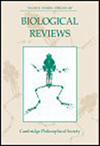Serotonergic modulation of behaviour: a phylogenetic overview.
Biological reviews of the Cambridge Philosophical Society
Pub Date : 1997-02-01
DOI:10.1017/s0006323196004975
引用次数: 0
Abstract
Serotonergic neurons are present in all phyla that possess nervous systems. In most of these phyla, serotonin modulates important behaviours, including feeding, sexual and aggressive behaviour. Serotonin exerts its effects by acting in three basic modes: as a classical neurotransmitter, as a neuromodulator, or as a neurohormone. In a number of invertebrate species, the neural circuitry underlying the effects of serotonin has been well characterized, whereas in vertebrates, the mechanisms by which serotonin affects behaviour are currently less fully understood. The following review examines the role played by serotonin in the generation and modulation of behaviour in successively more complex species, ranging from coelenterates to humans.
5 -羟色胺能对行为的调节:系统发育综述。
5 -羟色胺能神经元存在于所有具有神经系统的动物中。在大多数这些门中,血清素调节重要的行为,包括进食、性行为和攻击行为。血清素通过三种基本模式发挥作用:作为经典的神经递质,作为神经调节剂,或作为神经激素。在许多无脊椎动物中,5 -羟色胺作用的神经回路已经被很好地表征,而在脊椎动物中,5 -羟色胺影响行为的机制目前还不完全清楚。下面的综述考察了血清素在从腔肠动物到人类等一系列更复杂物种的行为产生和调节中所起的作用。
本文章由计算机程序翻译,如有差异,请以英文原文为准。
求助全文
约1分钟内获得全文
求助全文

 求助内容:
求助内容: 应助结果提醒方式:
应助结果提醒方式:


